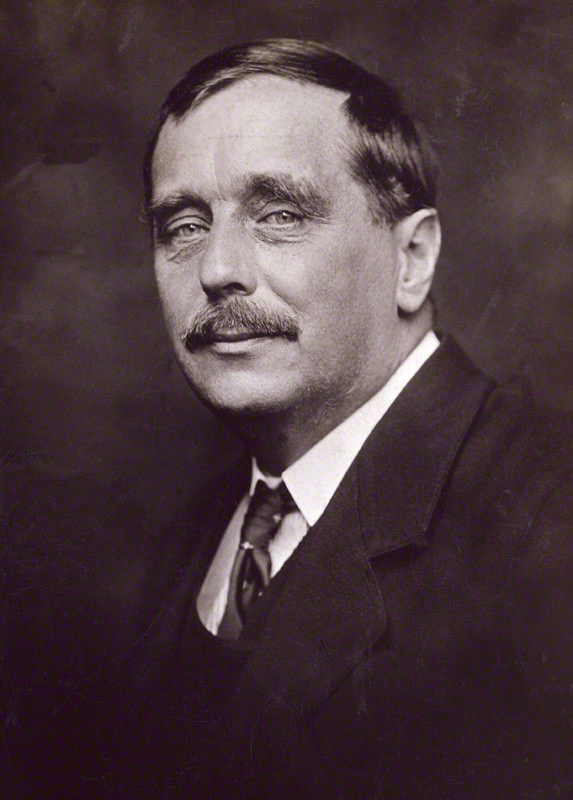Герберт Джордж Уэллс знаменитые цитаты
Герберт Джордж Уэллс Цитаты о мужчинах
„Человек, который жрёт, как свинья, должен и выглядеть, как свинья.“
«Правда о Пайкрафте»* Мысль — удивительная вещь: то она течет медленно, как смола, то вспыхивает мгновенно, как молния.
«Чудотворец»
Лев Успенский, «Записки старого петербуржца»
Среди них есть и такие тупицы, которые способны отменить преподавание химии, если только не заверить их, что это «пролетарская» химия, или наложить запрет на любой орнамент, как реакционный, если в нём не фигурирует сочетание букв РСФСР...
And in the face of gigantic difficulties they are trying to rebuild a new Russia among the ruins. We may quarrel with their principles and methods, we may call their schemes Utopian and so forth, we may sneer at or we may dread what they are doing, but it is no good pretending that there is no creative effort in Russia at the present time. A certain section of the Bolsheviks are hard-minded, doctrinaire and unteachable men, fanatics who believe that the mere destruction of capitalism, the disuse of money and trading, the effacement of all social differences, will in itself bring about a sort of bleak millennium. There are Bolsheviki so stupid that they would stop the teaching of chemistry in schools until they were assured it was "proletarian" chemistry, and who would suppress every decorative design that was not an elaboration of the letters R.S.F.S.R. ...
4. Созидательная работа в России.
перевод с уточнениями
Россия в тенях (1920)
Источник: Герберт Уэллс. Россия во мгле http://lib.ru/INOFANT/UELS/russia.txt. Собрание сочинений в 15-ти томах. Т. 15 / пер. И. Виккер, В. Пастоев. — М.: Правда, 1964.
Источник: Russia in the Shadows by H. G. Wells http://www.gutenberg.net.au/ebooks06/0602371h.html
Герберт Джордж Уэллс цитаты
„Наша истинная национальность — это человечество.“
Our true nationality is mankind.
«Очерки истории цивилизации», глава 41
видимость
Источник: Война миров
страус, птица, бриллиант
Источник: рассказы
муравьи
Источник: рассказы
сон
Источник: Машина времени
мысли
Источник: Очерки истории цивилизации
птица
Источник: Война миров
„Ругаться так красноречиво и замысловато мог только образованный человек.“
ругань
Источник: Человек-невидимка. Рассказы (сборник)
I confess that I approached Stalin with a certain amount of suspicion and prejudice. A picture had been built up in my mind of a very reserved and self-centred fanatic, a despot without vices, a jealous monopolizer of power. <…> I still expected to meet a ruthless, hard—possibly doctrinaire—and self-sufficient man at Moscow; a Georgian highlander whose spirit had never completely emerged from its native mountain glen. Yet I had had to recognize that under him Russia was not being merely tyrannized over and held down; it was being governed and it was getting on. <…> All such shadowy undertow, all suspicion of hidden emotional tensions, ceased for ever, after I had talked to him for a few minutes. <…> But Stalin was almost as much a trained mind, trained in the doctrines of Lenin and Marx, as those governess-trained minds of the British Foreign Office and diplomatic service, of which I have already written so unkindly. He was as little adaptable. <…> Sometimes I seemed to get him moving as I wanted him to move, but directly he felt he was having his feet shifted, he would clutch at some time-honoured phrase and struggle back to orthodoxy. <…> I have never met a man more candid, fair and honest, and to these qualities it is, and to nothing occult and sinister, that he owes his tremendous undisputed ascendency in Russia.
гл. 9, 9; перевод с англ. яз., Wells, H.G. (1934), Experiment in Autobiography, New-York, p. 685-690.
Опыт автобиографии (1934)
Источник: Experiment in Autobiography by H. G. Wells, 1934 http://www.gutenberg.ca/ebooks/wellshg-autobiography/wellshg-autobiography-00-h-dir/wellshg-autobiography-00-h.html
марсиане
Источник: Война миров
Герберт Джордж Уэллс: Цитаты на английском языке
Источник: The Island of Doctor Moreau (1896), Ch. 16: How the Beast Folk Tasted Blood
“The Boss: You are not mechanics, you are warriors. You have been trained, not to think, but to do.”
Things to Come (1936)
“How small the vastest of human catastrophes may seem at a distance of a few million miles.”
"The Star", final line, first published in The Graphic, Christmas issue (1897)
“Our true nationality is mankind.”
Источник: The Outline of History (1920), Ch. 41
“For crude classifications and false generalisations are the curse of all organised human life.”
Источник: A Modern Utopia (1905), Ch. 10, sect. 1
Источник: The Island of Doctor Moreau (1896), Ch. 14: Doctor Moreau Explains
“Rowena: You’ve got the subtlety of a bullfrog.”
Things to Come (1936)
Источник: The Invisible Man (1897), Chapter 20: At the House In Great Portland Street
"What I Believe", The Listener, 1929. Quoted in Clifton Fadiman, I Believe, London, George Allen and Unwin, 1940.
The Rights of Man, or what are we fighting for? (1940)
“The uglier a man's legs are, the better he plays golf. It's almost a law.”
Bealby: A Holiday (1915)
Источник: The Invisible Man (1897), Chapter 21: In Oxford Street
Источник: The Island of Doctor Moreau (1896), Ch. 21: The Reversion of the Beast Folk
“An artist who theorizes about his work is no longer artist but critic.”
The Temptaion of Harringay (1929)
“Adapt or perish, now as ever, is Nature's inexorable imperative.”
The Mind at the End of its Tether (1945), p. 19
